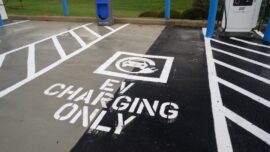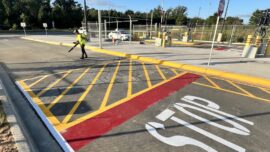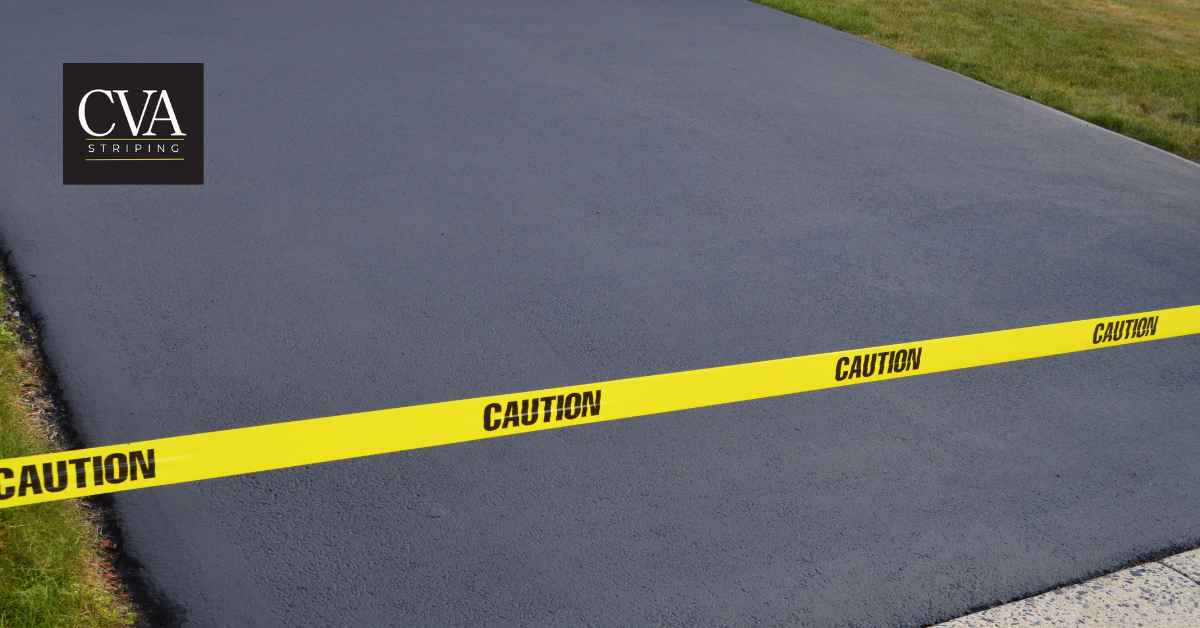
What is Sealcoating? Protecting and Enhancing Your Asphalt Surfaces
What Is Sealcoating? Sealcoating is a protective layer applied to asphalt surfaces to safeguard them from damage and enhance their appearance. It acts as a barrier against harmful elements like water, oil, and UV rays, preventing them from penetrating the asphalt and causing deterioration. By understanding what sealcoating is and its benefits, you can keep your driveway or parking lot in excellent condition.
This guide will cover the importance of sealcoating, how it extends the lifespan of asphalt, the advantages it offers, and more. Whether you’re a homeowner looking to maintain your driveway or a business owner aiming to keep your parking lot in top shape, sealcoating is an essential part of asphalt maintenance.
Why is Sealcoating Important for Asphalt Surfaces?
Sealcoating is crucial because it provides a barrier against elements like water, oil, and UV rays. Without this protective layer, asphalt can deteriorate quickly, leading to cracks, potholes, and other damage. By applying a sealcoat, you protect the asphalt from these harmful elements, ensuring it remains in good condition for longer.
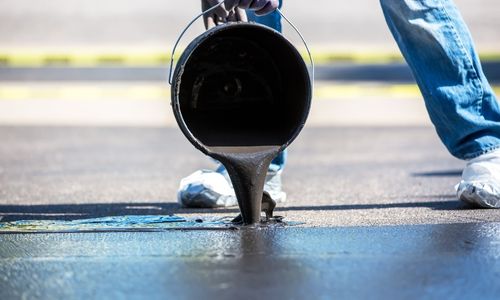
Additionally, sealcoating enhances the appearance of asphalt, giving it a fresh, new look. This makes cleaning and maintenance easier by creating a smooth, non-porous surface that repels dirt, oil, and debris. It also provides a safer surface for both vehicles and pedestrians by improving traction and reducing the risk of accidents caused by loose or damaged asphalt. Furthermore, it also helps you avoid costly repairs down the line by addressing potential issues before they become serious problems. Ultimately, investing in sealcoating not only prolongs the lifespan of your asphalt but also offers both practical and financial benefits, making it an essential part of asphalt maintenance.
How Does Sealcoating Extend the Lifespan of Asphalt?
Richmond, VA Sealcoating fills surface voids, reducing exposure to oxygen and sunlight. This process prevents the asphalt from becoming brittle and protects it from environmental damage. By keeping water and oil from penetrating the surface, sealcoating minimizes the freeze-thaw cycle’s impact, which can cause significant cracking and damage over time.
Sealcoating also prevents oxidation, which can degrade asphalt. Regular sealcoating maintains the asphalt’s flexibility and durability. This is how sealcoating helps in extending the lifespan of asphalt.
The Advantages of Sealcoating Your Driveway or Parking Lot
Sealcoating in Richmond offers numerous benefits for both residential and commercial properties. It not only protects and enhances the appearance of asphalt surfaces but also extends their lifespan and reduces maintenance costs. Here are the key advantages of sealcoating:
- Protection from Elements: It shields asphalt from water, oil, and UV rays, preventing cracks and potholes.
Enhanced - Appearance: This gives a fresh, black finish that significantly improves curb appeal.
Cost-Effective - Maintenance: Regular sealcoating reduces the need for costly repairs, saving money in the long run.
- Increased Safety: Provides a smooth surface for walking and driving, reducing trip hazards and improving traction.
When to Sealcoat Your Asphalt
Knowing when to sealcoat your asphalt is essential for maximizing its benefits. Typically, it’s best to sealcoat your asphalt every 2-3 years, depending on its condition and usage. Newly laid asphalt should be sealed after 6-12 months to allow it to cure properly. Sealcoating during the right weather conditions—typically during warmer months—ensures optimal adhesion and effectiveness. Avoid sealcoating during rainy or cold weather, as these conditions can affect the curing process. Regular inspections can help determine the best time to apply a new sealcoat, ensuring your asphalt remains in top condition.
Steps Involved in Preparing Asphalt Surfaces for Sealcoating
Proper preparation is key to a successful asphalt sealcoating job. Here’s what you need to know about preparing your asphalt surface:
Preparation Steps
Preparing your asphalt surface correctly is crucial for ensuring the sealcoat adheres properly and provides maximum protection. Follow these steps to prepare your asphalt for sealcoating:
- Clean the Surface Thoroughly
Remove all debris, dirt, and vegetation from the asphalt surface using a broom or power blower. - Wash the Asphalt
Use a pressure washer to clean the asphalt, removing any remaining dirt and grime. - Repair Cracks and Potholes
Fill any cracks or potholes with an appropriate asphalt repair material. Allow these repairs to cure completely before proceeding. - Treat Oil Spots
Apply an oil spot primer to any areas where oil stains are present. This ensures the sealcoat adheres properly to the asphalt. - Dry the Surface
Make sure the asphalt is completely dry before applying the sealcoat. Moisture can prevent the sealcoat from adhering correctly.
Application Techniques
Once the asphalt surface is properly prepared, the sealcoating application can begin. Here are the steps to ensure even and effective application:
- Mix the Sealcoat
Stir the sealcoat thoroughly to ensure it is well mixed and ready for application. - Apply the Sealcoat
Use a squeegee, brush, or spray method to apply the sealcoat evenly across the asphalt surface. Begin at one end and work your way to the o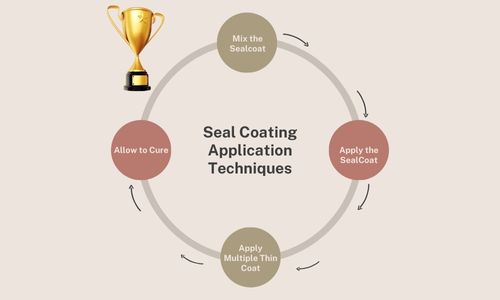 ther, ensuring complete coverage.
ther, ensuring complete coverage. - Apply Multiple Thin Coats
Instead of one thick coat, apply multiple thin layers. Allow each coat to dry before applying the next one. This helps the sealcoat cure properly and provides better protection. - Allow to Cure
Once the final coat is applied, allow the sealcoat to cure for at least 24-48 hours before using the asphalt surface. This curing time may vary depending on weather conditions and the specific sealcoat product used.
Different Types of Sealcoating Materials and Their Applications
There are various types of sealcoating materials, each with its benefits and applications. Understanding these options can help you choose the best material for your specific needs.
Coal Tar Sealcoating
Coal Tar Sealcoating is known for its durability and excellent protection against oil and chemical spills. It’s a popular choice for high-traffic areas like parking lots and commercial driveways due to its resilience and long-lasting properties. Coal tar also provides superior resistance to UV rays, preventing asphalt from becoming brittle. However, it’s important to note that coal tar has a strong odor and may not be the most environmentally friendly option.
Asphalt Emulsion Sealcoating
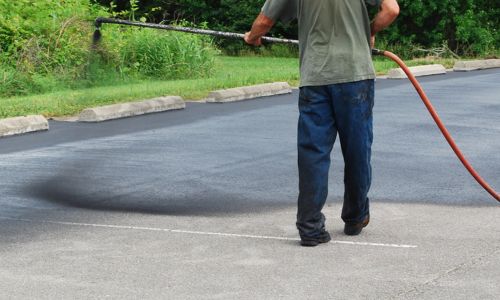
Asphalt Emulsion is an environmentally friendly option that offers good protection against water and UV rays. Made from a blend of asphalt and water, this sealcoat is less harmful to the environment and has a milder odor compared to coal tar. It’s suitable for residential driveways and low-traffic areas, providing a more natural app
earance that blends well with the asphalt. Asphalt emulsion is easy to apply and dries quickly, making it a convenient choice for homeowners.
Acrylic Sealcoating
Acrylic Sealcoating is highly durable and resistant to UV rays and weathering. This type of sealcoat is ideal for areas with extreme weather conditions, as it can withstand significant temperature fluctuations without cracking. Acrylic sealcoating is also available in a variety of colors, allowing for greater aesthetic flexibility and customization. It’s a versatile choice for both residential and commercial properties, providing long-lasting protection and enhancing curb appeal.
Sealcoating: DIY vs. Professional Services
While DIY seal coating can save money initially, professional services ensure the job is done correctly and lasts longer. DIY projects can be cheaper upfront and allow for flexibility in scheduling, but they have significant drawbacks. Proper application requires skill and experience, and mistakes can lead to poor adhesion and reduced durability. DIY kits often lack the quality of professional-grade equipment, resulting in uneven coverage and a less attractive finish. Additionally, the process is labor-intensive and time-consuming, especially for large areas, and may not effectively address underlying issues like cracks or potholes.
Professional sealcoating services offer numerous advantages. Professionals like CVA Line Striping LLC in Richmond, VA have extensive experience and know the best techniques and materials for different asphalt surfaces. We use high-quality equipment that ensures even application and better adhesion, resulting in a more durable and attractive finish. Comprehensive maintenance services include thorough preparation, such as cleaning, repairing cracks, and treating oil spots, ensuring that underlying issues are identified and addressed. By hiring professional services, you achieve a higher-quality, longer-lasting result, making it a worthwhile investment for both residential and commercial properties.in
What Factors Influence the Cost of Sealcoating Asphalt Surfaces?
Understanding the factors that influence the cost of sealcoating can help you budget effectively for your project. Several elements play a role in determining the overall expense:
- Size of the Area: Larger areas require more materials and labor, which increases the overall cost.
Type of Sealcoat Used: Different sealcoating materials have varying costs. For instance, coal tar might be more expensive than asphalt emulsion, but it offers different benefits. - Condition of the Asphalt: The current state of your asphalt significantly affects the cost. If your surface has numerous cracks, potholes, or oil stains, these need to be repaired before sealcoating, which can add to the expense.
- Geographic Location: Prices can vary based on your location due to differences in labor costs and material availability.
- Weather Conditions: Seasonal factors can affect the cost. Sealcoating is best done in warmer weather, and scheduling during peak times might increase the price.
- Accessibility: Areas that are difficult to access or require special equipment may incur additional costs.
Final Tips for Maintaining Asphalt Surfaces
Proper maintenance ensures that the protective sealcoat remains effective and keeps your asphalt in top condition. Here are some tips to help you maintain your asphalt surfaces:
- Regular Cleaning: Regularly remove debris and clean oil spots promptly to prevent damage and keep the surface looking clean.
- Avoid Sharp Objects: Keep sharp objects away from the asphalt surface to prevent cuts and scratches that can compromise the sealcoat.
- Timely Repairs: Fix any cracks or potholes as soon as they appear to maintain a smooth surface and prevent costly repairs.
- Reapply Sealcoat: Schedule regular sealcoating every 2-3 years to maintain the protective barrier and ensure resilience against elements.
By following these tips, you can extend the life of your asphalt surfaces and keep them looking and functioning at their best. Regular maintenance not only preserves the appearance of your asphalt but also enhances its durability and performance. We hope this guide helps you maintain your asphalt surfaces effectively.
If you need professional assistance with sealcoating or asphalt maintenance, trust the experts at CVA Line Striping LLC. Contact us today at 804-432-3255 to ensure your asphalt surfaces remain in top condition for years to come!
Sealcoating FAQs
How Often Should Asphalt Be Sealcoated?
Asphalt should be sealcoated every 2-3 years, depending on its condition and traffic levels. Regular sealcoating helps maintain its appearance and durability.
Can Sealcoating Prevent Cracks?
Sealcoating helps prevent small cracks from becoming larger by providing a protective barrier against water and UV rays. However, it’s important to repair existing cracks before applying the sealcoat.
What Is the Cost of Sealcoating?
The cost of sealcoating varies based on the size of the area, the type of sealcoat used, and whether you hire professionals. Professional services offer better quality and longer-lasting results.
How Long Does Sealcoating Last?
Sealcoating typically lasts 2-3 years. Proper maintenance and timely reapplication can extend its lifespan, ensuring ongoing protection for your asphalt surfaces.
What Are the Benefits of Pavement Sealcoating?
Pavement sealcoating protects against water, oil, and UV damage, enhances appearance, and extends the lifespan of asphalt surfaces. It also improves safety by providing a smooth and even surface.
How Long Does Sealcoating Take To Dry?
Sealcoating drying time varies, but it usually takes 24-48 hours before you can drive on it. Factors like weather conditions and the type of sealcoat used can influence drying time.
What Types of Asphalt Surfaces Can Be Sealcoated?
Driveways, parking lots, and other paved surfaces can be sealcoated to improve durability and appearance. Sealcoating is versatile and suitable for various types of asphalt surfaces.
Does Sealcoating Protect Against UV Rays?
Yes, sealcoating provides a protective barrier against harmful UV rays, preventing asphalt from becoming brittle and cracking. This protection helps maintain the asphalt’s integrity and appearance.


